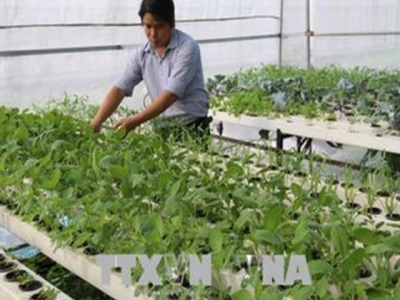Vietnam urged to develop smart agriculture in Revolution 4.0

As a country hard hit by climate change, Vietnam is in dire need to develop hi-tech agriculture to take advantage of the ongoing Industry 4.0 and boost its economy.
Model of hydroponic vegetable growing in the test site of the Center for Biotechnology and Technology (Department of Science and Technology) in Tien Giang province. Photo: Minh Tri/VNA
Experts have recommended Vietnam should apply advanced technologies to develop agriculture in a smart and sustainable way, especially as the country is striving to make use of the Fourth Industrial Revolution and climb up the value chain, Vietnam News Agency reported.
Vietnam should tap on technological advancements to restructure its agriculture, with solutions to smart and sustainable system of agriculture, said Deputy Minister of Agriculture and Rural Development Ha Cong Tuan at a workshop on smart agriculture.
The workshop was part of the ongoing Industry 4.0 Summit and Expo 2018, held in Hanoi on July 12-13. It drew participation of representatives of the government, organizations, enterprises, as well as experts and scientists in Vietnam and abroad.
The Vietnamese leadership attaches great importance to using high technology with an aim to adding more value, creating safer farm produce, boosting agricultural exports as well as improving farmers' living standards, Tuan said.
Advanced technologies have helped many countries reach higher levels of agricultural production. Therefore, applying scientific and technological achievements and Industry 4.0 in smart agriculture is a indispensable trend, the official stressed.
He said Vietnam exported US$36.4 billion worth of farm produce in 2017 and the figure is likely to reach US$40 billion in 2018. The official also pointed out some of the shortcomings of agricultural development in Vietnam, including products falling short of potential, scattered production, low value added farm produce, and the low rate of technological application.
Participants at the event suggested various ideas regarding high-tech application in agriculture, which include a smart agriculture management system and a policy on upgrading the value chain of rice towards sustainability and climate change adaptation in the Mekong Delta region.
They also talked about cloud computing and clean energy in farming, while sharing Japan’s experience in managing smart agriculture.
Sharing experiences from Israel's agro-ecological system, Israel's Deputy Chief of Mission (DCM) of the embassy of Israel to Vietnam and Laos. Doron Lebovich said his country does not posses optimal conditions for agricultural development. 50% of Israel's land is desert, only 20% of the land is cultivable, and it faces shortage of water for agricultural production.
However, Israel cannot only produce 95% of its food production in the country, but also exports agricultural products to other countries. Moreover, Israel has exported its agricultural technology globally, the diplomat said.
Climate change has caused a severe decline in water and food supply. Dorothy Lebovich suggested that countries need to find out more efficient ways to save water for agricultural production, reduce labor force in agriculture, and more effective investment with less resources.
To do this, each country needs to apply high-tech, smart agriculture. This is one of the solutions to help farmers and agricultural enterprises, he added.
Có thể bạn quan tâm
 Mangosteen crop of 2018 well yield, well pricing
Mangosteen crop of 2018 well yield, well pricing This year’s crop of mangosteen in Thuan An Town delighting of good yield and pricing as merchants have earned benefits of the crops.
 Vietnamese animal husbandry sector moves towards intensive production
Vietnamese animal husbandry sector moves towards intensive production The excess supply remains a problem for Vietnam's animal husbandry sector to resolve at present.
 Irrigation for protected crops
Irrigation for protected crops Paddy de Vries, national technical advisor for Hygrotech, talks to Nan Smith about basic fertigation techniques for tunnel farming.